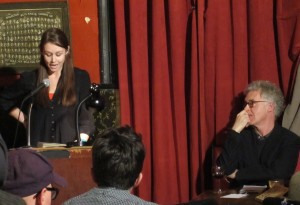news
Women Without Men
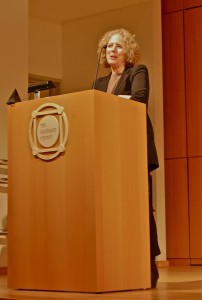
1. Feminist Press Executive Director Gloria Jacobs, introducing the evening with passion.

A large crowd gathered last night in the basement of the CUNY Graduate Center to celebrate the glorious reissue of Iranian writer Shahrnush Parsipur’s elegant 1989 novel Zanan bedoone mardan (or, Women Without Men). For the first time ever, the Feminist Press has guaranteed that Parsipur will finally see royalties for this novella of magical realism that once landed her in prison.
The event took place in conjunction with the exhibition Shifters, currently on view at the James Gallery, and featured a screening of artist Shirin Neshat’s adaption of the novella into a film, Women Without Men (2009). In the ensuing conversation between Parsipur and Neshat, it becomes clear that both had markedly different interpretations about the value of the story Parsipur set out to tell.
“When [the novella] was written, it was impossible to talk about politics. When Shirin made the film, she was free, she was out of Iran, she could talk about political change,” Parsipur explained. She is adamant in claiming she is not a feminist, yet her book tells the tale of several Iranian women, discontent with their position in daily life. Neshat weaves the 1953 coup d’etat of Iran in with the story of four female protagonists who use a mysterious orchard for salvation.
1. From left: Shahrnush Pasipur, Shirin Neshat, and Katherine Carl, Curator of the James Gallery and Deputy Director of the Center for the Humanities at the Graduate Center, in conversation. 2. Carl questions Nashat on the difficulty of adapting the novella into her first film.
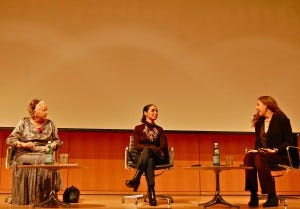
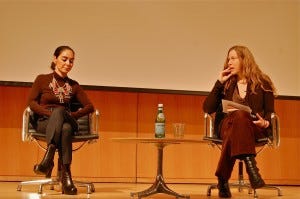
All in all, it took six years for this slight text to become a film, due to the complexity of setting and depth of characterization employed by Parsipur, resulting in a film that is haunting and memorable. The novella itself — a take on a Hemingway short story called “Men Without Women” — portrays femininity as Parsipur sees it. “Women are nothing, but they give shape. Almost like God. They want to a make the world but they haven’t any force.” We’re lucky that, despite odds most women in the US will never have to face, Parsipur and Neshat are still able to share their own creations with the world. Neither artist is allowed back in Iran.
1. As Parsipur simply states, “It’s a good film, and my book is a good book.”
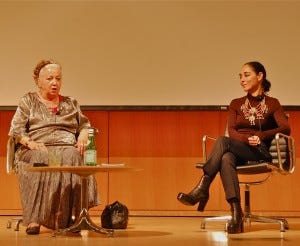
As Gloria Jacobs, executive director of the Feminist Press, so elegantly put it, “We need to support writers- we need their honesty.” To purchase this work and others by the Feminist Press, please visit their website.
***
— Sarah Lerner is a freelance event coordinator for the L Magazine. She contributes art and film reviews to Time Out New York.








